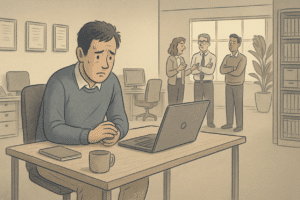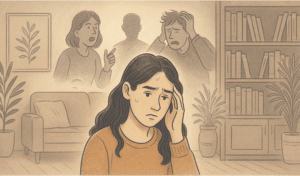Key Takeaways
- ADHD is a neurodevelopmental disorder characterized by genuine neurological challenges in attention, focus, and task completion.
- Laziness is a conscious choice to avoid tasks, while ADHD involves intense emotional struggle and effort to overcome cognitive barriers.
- People with ADHD experience unique brain chemistry that affects motivation, making task initiation and completion significantly more challenging.
- Understanding and challenging the “lazy” label is essential for supporting individuals with ADHD.
- A Mission for Michael (AMFM) offers specialized, comprehensive ADHD treatment with personalized care across multiple locations.
ADHD vs. Laziness: What’s the Difference?
Understanding ADHD
ADHD affects millions of people worldwide, characterized by symptoms such as inattention, hyperactivity, and impulsivity. Critically important is the understanding that these symptoms are not a choice; they are a result of fundamental differences in brain function. ADHD profoundly impacts cognitive functions such as focus and memory. Individuals with ADHD often find it extremely challenging to organize tasks, manage time, and maintain focus on mundane activities. This isn’t due to a lack of effort or desire, but rather a neurological challenge that requires specific, carefully developed strategies to manage.
What Truly Defines Laziness?
Laziness, in contrast, is a term describing a lack of willingness to perform tasks that one is fully capable of doing. It involves a conscious decision to avoid work or effort. Unlike ADHD, laziness doesn’t stem from neurological differences but rather from a personal choice. People who are lazy typically do not experience the same level of emotional distress over their inaction as those with ADHD might.
Misconceptions About ADHD and Laziness
One of the most damaging misconceptions is the belief that people with ADHD are simply lazy. This misunderstanding can lead to significant stigma and prevent individuals from seeking the help they desperately need. ADHD symptoms, such as forgetfulness and distractibility, are often misinterpreted as laziness, especially by those unfamiliar with the disorder’s intricate nature.
Societal expectations frequently exacerbate this misconception. The intense pressure to perform and the widespread lack of awareness about ADHD can result in unfair and harmful judgments. By dedicating ourselves to education and understanding, we can challenge these misconceptions and provide meaningful support to those living with ADHD.
| A Mission For Michael: Expert Mental Health Care Founded in 2010, A Mission For Michael (AMFM) offers specialized mental health care across Southern California, Washington, and Virginia. Our accredited facilities provide residential and outpatient programs, utilizing evidence-based therapies such as CBT, DBT, and EMDR. Our dedicated team of licensed professionals ensures every client receives the best care possible, supported by accreditations from The Joint Commission and the California Department of Health Care Services. We are committed to safety and personalized treatment plans. Start your recovery journey with AMFM today! |
Common ADHD Symptoms Mistaken for Laziness
Brain Chemistry and Procrastination
Unlike typical procrastination, ADHD-related procrastination is rooted in fundamental neurological challenges. This stems from differences in brain chemistry, particularly involving neurotransmitters like dopamine. When a task doesn’t generate enough dopamine or doesn’t appear immediately interesting, individuals with ADHD struggle to initiate and maintain focus.
Challenges with Starting Tasks
The prefrontal cortex—responsible for executive functions like planning, organizing, and starting tasks—functions differently in people with ADHD. Neuroimaging studies have shown that when people with ADHD attempt to concentrate, blood flow to this critical brain region actually decreases, making task initiation exponentially more challenging.
Memory and Forgetting
For someone with ADHD, “out of sight” truly means “out of mind.” This isn’t intentional carelessness but a manifestation of object permanence challenges. Once a task is no longer directly visible or immediately present, it can completely disappear from their mental radar. This isn’t laziness, but a genuine cognitive difference in how information and tasks are processed and remembered.
Getting Distracted
A seemingly minor distraction—like a distant conversation, a subtle lighting change, or a soft background noise—can completely derail their focus. This isn’t a choice to be unfocused, but a neurological reality where the brain struggles to filter and prioritize sensory information.
Emotional Impact
Unlike someone who is lazy and feels indifferent, individuals with ADHD often experience intense frustration, anxiety, and feelings of inadequacy. They are acutely aware of their struggles and typically want desperately to complete tasks, which makes their difficulties even more emotionally taxing.
Trouble with Time
People with ADHD often experience time differently, struggling to accurately estimate how long tasks will take or to maintain a consistent sense of time progression. This can lead to apparent procrastination or last-minute rushes, which appear like laziness to outside observers but are actually symptoms of their neurological difference.
Managing ADHD Effectively
Professional Diagnosis: The First Step
A professional diagnosis is the first step in understanding and managing ADHD. Qualified healthcare professionals conduct comprehensive evaluations that go beyond simple symptom checking. This process involves detailed medical history, psychological testing, and ruling out other potential conditions. An accurate diagnosis provides a clear roadmap for treatment and support.
Shifting Perspective
ADHD is a neurological condition, not a personal failing. This fundamental understanding is critical. Recognizing that ADHD stems from unique brain functioning, rather than a lack of effort or motivation, allows individuals to approach their challenges with self-compassion and strategic thinking.
Developing Tailored Strategies
Management requires personalized approaches. This might include creating structured routines, using organizational tools like digital planners and reminder apps, and breaking tasks into smaller, manageable steps. Each strategy should be customized to the individual’s specific ADHD manifestations and life circumstances.
Comprehensive Support System
Building a strong support network is essential. This includes understanding family members, supportive colleagues, therapists, and potentially ADHD support groups. These connections provide emotional support, practical assistance, and a sense of community that are essential in managing ADHD effectively.
Holistic Treatment Approach
Effective ADHD management often involves a combination of approaches. This may include medication to support neurotransmitter function, cognitive behavioral therapy, lifestyle modifications, and ongoing professional guidance. The goal is not to “cure” ADHD, but to develop effective coping mechanisms and strategies for success.
Practical Strategies to Improve Focus and Organization

Mindfulness and routines help manage ADHD.
Creating Structured Routines
Establishing consistent daily routines is important for managing ADHD symptoms. This involves creating predictable schedules that provide structure and reduce decision fatigue. Routines help compensate for challenges with time management and memory, making daily tasks more manageable and less overwhelming.
Organization Tools
Leveraging technology and physical tools can significantly improve organization. Digital apps, electronic calendars, reminder systems, and physical planners can help track tasks, set reminders, and break down complex projects. The key is finding tools that match individual learning and organizational styles.
Task Management Techniques
Breaking tasks into smaller, more digestible steps is a powerful strategy for individuals with ADHD. This approach reduces feelings of overwhelm and provides clear, achievable objectives. Using techniques like the Pomodoro method (working in focused, timed intervals) can help maintain concentration and prevent mental fatigue.
Goal Setting and Motivation
Developing a reward system can boost motivation and productivity. Setting clear, realistic goals and creating meaningful rewards helps activate the brain’s dopamine system. This approach transforms task completion from a challenging chore to an achievable, potentially enjoyable process.
Physical Exercise as a Management Tool
Regular physical activity is a powerful strategy for managing ADHD symptoms. Exercise has been scientifically proven to improve concentration, reduce impulsivity, and regulate mood. The key is finding an enjoyable and sustainable form of physical activity that can be consistently maintained.
Environmental Optimization
Creating an environment that supports focus might involve minimizing distractions, using noise-canceling headphones, organizing the workspace to reduce visual clutter, and identifying optimal working conditions that support concentration.
Mindfulness and Emotional Regulation
Incorporating mindfulness practices and emotional regulation techniques can help manage ADHD symptoms. Meditation, deep breathing exercises, and cognitive behavioral strategies can improve focus, reduce anxiety, and enhance overall emotional well-being.
The Role of Self-Perception: Challenging the “Lazy” Label
Understanding Personal Identity
Self-perception plays a critical role in how individuals with ADHD go through their lives. The damaging “lazy” label can cause profound emotional harm, eroding self-esteem and confidence. Recognizing that ADHD symptoms are neurological, not personal failings, is the first step in rebuilding a positive self-image.
Reframing Internal Dialogue
Challenging negative self-talk requires conscious effort. Individuals with ADHD must learn to replace self-criticism with compassionate understanding. This means acknowledging struggles while also recognizing unique strengths and abilities that come with neurodiversity.
Breaking the Stigma
The misconception of laziness stems from a fundamental misunderstanding of ADHD. Society often judges based on visible productivity, failing to recognize the immense effort individuals with ADHD invest in managing their symptoms. Educating others and oneself becomes a powerful tool in challenging these harmful perceptions.
Embracing Neurodiversity
Unique Perspectives
Neurodiversity celebrates the value of different cognitive approaches. Individuals with ADHD often bring exceptional creativity, innovative thinking, and unique problem-solving skills. These strengths are not limitations but powerful attributes that can drive success in various fields.
Creating Inclusive Environments
Embracing neurodiversity means creating spaces that accommodate different thinking and working styles. This involves recognizing that there’s no single “right” way to approach tasks or learn. By valuing diverse cognitive approaches, we can unlock potential and foster innovation.
Personal Growth and Empowerment
The journey involves transforming self-perception from a place of shame to one of empowerment. Understanding ADHD as a different way of processing information, rather than a deficit, allows individuals to develop strategies that work with their unique brain wiring, not against it.
Societal Impact
By challenging stereotypes and embracing neurodiversity, we create a more understanding and innovative society. Recognizing the value of different cognitive styles benefits not just individuals with ADHD, but enhances collective creativity and problem-solving capabilities.
Seeking a Professional Diagnosis
A professional diagnosis is important for anyone suspecting they have ADHD. This diagnosis should be conducted by a qualified healthcare professional, such as a psychologist or psychiatrist, who can comprehensively evaluate symptoms and provide an accurate assessment. A proper diagnosis confirms the presence of ADHD and rules out other conditions that might present similar symptoms, such as anxiety or depression.
Why Choose A Mission for Michael for Your ADHD Treatment?

Professional ADHD treatment provides structure, accountability, and support.
At A Mission for Michael (AMFM), we offer a specialized approach to ADHD treatment across multiple locations in California, Washington, and Virginia. Our mental health professionals have extensive expertise in treating ADHD and related dual diagnosis conditions. We provide a multidisciplinary team of psychologists, psychiatrists, therapists, and educators who create customized treatment plans.
Holistic Treatment Approach
We take a whole-person approach to ADHD management, addressing mental, emotional, and physical aspects of the condition. Our treatment goes beyond symptom management, focusing on developing strategies to improve attention, organizational skills, and overall functioning. We offer a combination of behavioral therapy, medication management, and educational support to help individuals with ADHD thrive.
Accessible and Supportive Services

Finding the right ADHD support means working with professionals who understand your unique needs.
AMFM is committed to providing accessible, confidential, and comprehensive mental health services. We offer free assessments, accept most major insurance providers, and provide support that extends to families. Our goal is to help individuals with ADHD develop effective coping strategies, improve their quality of life, and unlock their full potential through personalized, compassionate care.
Frequently Asked Questions
What is the difference between ADHD and laziness?
ADHD is a neurodevelopmental disorder involving neurological challenges with focus and task completion, while laziness is a conscious choice to avoid tasks without significant emotional distress.
Can ADHD be mistaken for laziness?
Yes, many ADHD symptoms like procrastination, forgetfulness, and difficulty concentrating can be misinterpreted as laziness by those unfamiliar with the condition.
How does ADHD affect daily functioning?
ADHD can significantly impact personal relationships, professional performance, and emotional well-being by causing challenges with time management, organization, and sustained attention.
Is ADHD a lifelong condition?
ADHD is typically a chronic condition that begins in childhood and often continues into adulthood, requiring ongoing management and support.
Why should I choose A Mission for Michael for ADHD treatment?
A Mission for Michael (AMFM) offers comprehensive, personalized ADHD treatment with a multidisciplinary approach, providing specialized care across California, Washington, and Virginia to help individuals develop effective coping strategies and improve their quality of life.







